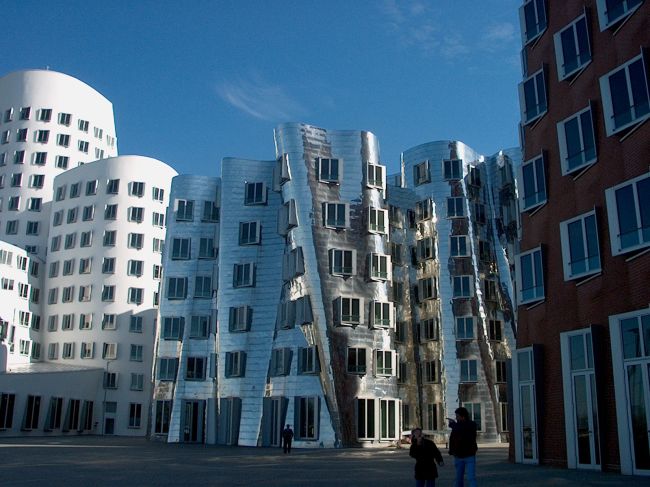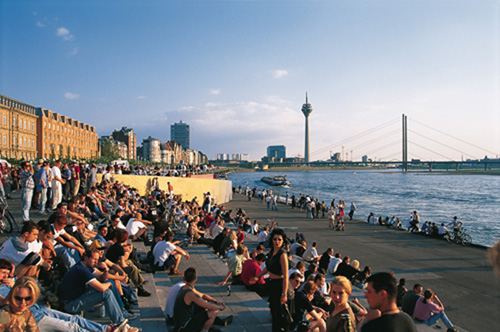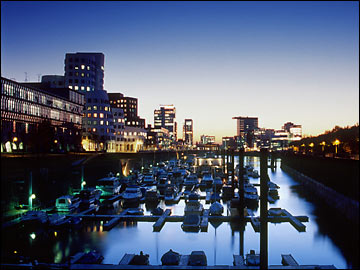

Düsseldorf is the capital city of the German state of North Rhine-Westphalia. It an economic centre of Germany. The city is situated on the River Rhine and also has a high population density - the Rhine-Ruhr metropolitan area has over 10 million inhabitants alone. The city is renowned for its many events and also for its fashion and trade fairs. Every July more than 4.5 million people visit the Große Düsseldorfer Kirmes fair.
When the Roman Empire was strengthening its position throughout Europe, a few Germanic tribes clung on to their marshy territory off the eastern banks of the Rhine River.

In the 7th and 8th centuries, the odd farming or fishing settlement could be found at the point where the small river Düssel flows into the Rhine. It was from such settlements that the city of Düsseldorf grew.
The first written mention of the town of Düsseldorf dates back to 1135 (then called Düsseldorp). It was told that under Emperor Friedrich Barbarossa the small town of Kaiserswerth, lying to the North of Düsseldorf, became a well fortified outpost, where soldiers kept their watchful eyes over every movement on the Rhine. Kaiserswerth eventually became a suburb of Düsseldorf in 1929.
In 1186 Düsseldorf came under the rule of Berg. The counts of Berg moved their seat to the town in 1280. 14 August 1288 is one of the most important dates in the history of Düsseldorf as it was on this day that the sovereign Count Adolf V of Berg granted the village on the banks of the Düssel city rights.Prior to that announcement, a bloody struggle for power had taken place between the Archbishop of Cologne and the count of Berg, culminating in the Battle of Worringen. The Archbishop of Cologne's forces were wiped out by the forces of the count of Berg who were supported by citizens and boors of Cologne and Düsseldorf, paving the way for Düsseldorf's elevation to city status, which is remembered today with a monument on the Burgplatz. After this battle the relationship of the two cities deteriorated, because they were commercial rivals. It is often said that there is a kind of hostility between the citizens of Cologne and Düsseldorf. Today, it finds its expression mainly in a humorous form (especially during the Rhineland Karneval) and in sports.

A market square sprang up on the banks of the Rhine and the square was protected by city walls in all four directions. In 1380, Düsseldorf was made regional capital of the Duchy of Berg. During the following centuries several famous landmarks were built, including the Collegiate Church of St. Lambertus. In 1609, the ducal line of Jülich-Berg-Cleves died out, and after a virulent struggle over succession, Jülich and Berg fell to the Wittelsbach Counts of Palatinate-Neuburg, who made Düsseldorf their main domicile, even after they inherited the Palatinate, in 1685, becoming now Prince-electors as Electors Palatine.
Düsseldorf's growth was even more impressive under the leadership of Johann Wilhelm II (r. 1690-1716) in the 18th century, also known to his people as Jan Wellem. Greatly influenced by his wife Anna Maria Luisa de' Medici, the art lover designed a vast art gallery with a huge selection of paintings and sculptures that were housed in the Stadtschloss (city castle).
After the death of childless Jan Wellem, the flourishing royal capital fell back to hard times, especially after Elector Karl Theodor inherited Bavaria and moved the electoral court to Munich. With him he took the art collection, which became part of what is now the Alte Pinakothek in Munich. Destruction and poverty struck Düsseldorf after the Napoleonic Wars. Napoleon made Berg a Grand Duchy and Düsseldorf its capital. J. C. C. Devaranne, a leader of Solingen's resistance to Napoleon's conscription decrees, was executed here in 1813. After the defeat of Napoleon, the whole Rhineland including Berg was given to the Kingdom of Prussia in 1815. The parliament of the Rhine Province was established in Düsseldorf later.

By the mid-19th century, Düsseldorf enjoyed a revival thanks to the Industrial Revolution as the city boasted 100,000 inhabitants by 1882; the figure doubled in 1892. However, the First and Second World Wars soon plunged Düsseldorf into depression. During World War II, the city was virtually reduced to a pile of rubble as round-the-clock air attacks took their toll.
In 1946 Düsseldorf was made capital of the new federal state of North Rhine-Westphalia. The city's reconstruction proceeded at a frantic pace and the economic transformation saw Düsseldorf growing into the wealthy city of trade, administration and service industries as it is known today.
Düsseldorf is not only widely known as a center of the German advertising and fashion industries: in the last few years the city on the Rhine has become one of the top telecommunications centers in Germany. There are 18 internet providers located in the capital of North-Rhine Westphalia. With two of the four big German providers of mobile frequencies, D2 Vodafone and E-Plus, Düsseldorf leads the German mobile phone market. There are also many foreign trading centers in Düsseldorf such as NTT, Ericsson, Nokia and GTS.
Many of the internet companies in Düsseldorf have their roots in the world of advertising: there are 400 advertising agencies in Düsseldorf, among them three of the largest in Germany: BBDO Group, Publicis Group and Grey Group. A number of affiliates of foreign agencies deserve mention as well, such as Ogilvy & Mather, Dentsu, Hakuhodu, Digital District and DDB.
In Düsseldorf there are about 170 national and international financial institutions and about 130 insurance agencies and one of the biggest German stock exchanges. There are also about 200 publishing houses in Düsseldorf.
Several other major German companies have their headquarters in the city: Henkel KGaA (Branded Consumer Goods and Industrial technologies); E.ON (energy); ThyssenKrupp (metallurgy); Metro (wholesale, retail); Ergo (insurance); LTU (air transport), Cognis (chemicals, headquarter in Monheim near Düsseldorf, but production mainly in Düsseldorf).
Daimler builds the transporter Mercedes-Benz Sprinter in Düsseldorf.
Since the 1960s, there has been a strong relationship between the city and Japan. Many Japanese banks and corporations have their European headquarters in Düsseldorf - so many that Düsseldorf has the third largest Japanese community in Europe, after London and Paris. [5] [6]
The "Kö", which stands for Königsallee (King's Avenue) is a popular shopping destination. Some of the most reputed jewellery shops, designer labels, and galleries have their stores here. The Kö has about the highest rents for shops and bureaus in Germany. [7]